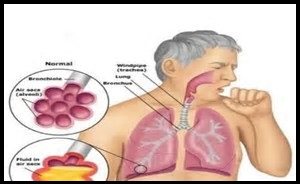
According to the National Center for Health Statistics, the 8th leading cause of death in the U.S. In 2010 was pneumonia when combined with influenza. In the elderly, pneumonia is a serious matter.
What is pneumonia and what makes it so serious?
According to Dr. Norman Edelman, chief medical officer for the American Lung Association, “Pneumonia is an inflammation of the lungs usually caused by bacteria, viruses, fungi or other organisms.”
Pneumonia is so severe because the infection causes oxygen levels in the bloodstream to decline. It means that blood flow to important organs of the body is what the brain concentrates on and decreases it to other organs such as the gastrointestinal tract to keep the vital organs working. It is a safety precaution that the body has to keep people alive in less than ideal situations.
The problem is that if the infection doesn’t go away, blood flow to all areas of the body is limited. It is also dangerous over the long term because the disease often spreads to the blood stream, which is life-threatening and hard to stop once it starts.
In the elderly, the situation is even worse, because seniors already have weakened immune systems making it difficult for them to fight it.
Symptoms of pneumonia include:
- A cough that persists
- Green or yellow sputum
- Fever
- Chills
- Shortness of breath
Ways to prevent pneumonia in the elderly
Hand washing
A lack of hand washing allows germs to spread. Always make sure your loved ones wash their hands before eating, after using a public restroom, and after touching bodily fluids.
Good health habits
Overall good health habits can help prevent it because they keep your body strong and your immune system healthy. Encourage your loved ones to exercise, get enough rest, and eat a healthy diet.
Pneumococcal vaccine
This vaccine should be taken in a person’s 50s and the second dose at age 65. A new dose should be given every five years. It assists in preventing over 23 strains of pneumonia.
Influenza vaccine
Another important vaccine. It is not as effective in the elderly, but it can keep a case of the flu on the milder side. It often occurs after a case of influenza, so minimizing the influenza infection can help reduce the risks of getting pneumonia.

